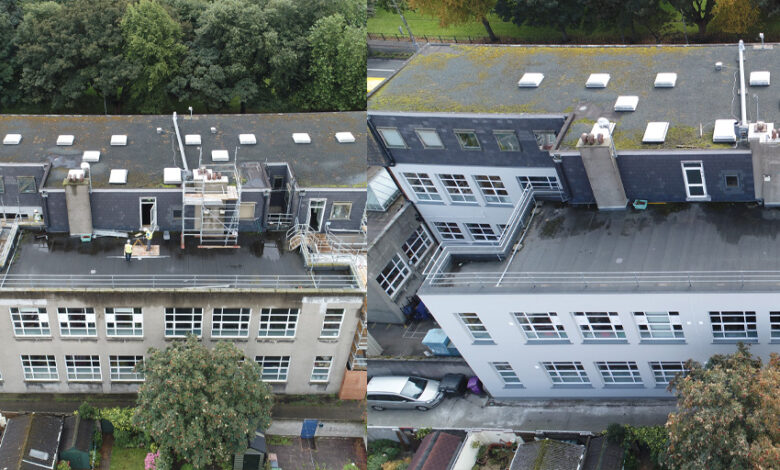Breffni Eco Group: Expertise in deep retrofitting

Breffni Insulation was established in 2006 providing insulation solutions and is now part of the Breffni Eco Group of companies which is a proven leader in the design and delivery of energy reduction measures across the Irish construction industry.
Given the global focus and effort on energy reduction and alleviating energy poverty, Breffni Eco Group is now a one stop shop for the design and delivery of deep energy retrofit works across the country.
These energy efficient upgrades achieve amongst other things reduction in CO2 levels, improving home comfort and reducing energy costs for all who avail of the measures but more importantly the most vulnerable in society. Our knowledge and expertise in the insulation and energy upgrade market makes us the partner of choice for SEAI, local authorities, Department of Education, HSE, and commercial and private customers having successfully serviced and delivered complex projects across all these sectors for nearly three decades.
Breffni Eco Group have a growing team of more than 40 direct employees as well as an extensive network of loyal and trusted subcontractors which are coordinated and managed by a dedicated and experienced team of construction professionals.

Our services include, consultation, design, and delivery of all energy upgrade measures, including bonded bead cavity wall insulation, internal and external wall insulation, spray foam insulation, roof, attic and acoustic insulation, airtightness solutions, heating and heating controls upgrades, and ventilation systems. Renewables including solar PV and thermal, EV chargers, and heat pumps as well smart technologies. Complete window and door replacement works as well as associated builders works to provide a complete turnkey service.
A customer-first approach to meet programme requirements and operational processes
Breffni Eco Group have successfully delivered on behalf of SEAI for close to two decades through our participation in a variety of schemes, including the Better Energy Warmer Homes Scheme, One Stop Shop, Better Energy Homes, Better Energy Communities Schemes, and Deep Retrofit Pilot Scheme. We understand that many customers that avail of the scheme are those facing fuel poverty, those with disabilities, older populations, and other vulnerable sectors of society that may require special care. We also understand that in the majority of cases the homes will be occupied at the time the works occur. It is of the utmost importance that anyone working directly with the customer understands the technical and operational requirements of the scheme in its entirety, including the contractor code of conduct.
Upgrading occupied homes to energy poor and vulnerable customers
Breffni Eco Group strive to install measures in a way that minimises disruption to the homeowner at all times, however, there are some measures where some level of disruption is to be expected. This is especially true on deeper retrofit projects that include measures like external wall insulation, internal wall dry lining, window and door upgrades, and heating system upgrades. We reduce the inconvenience to the customer by using utilising our experience, visual aids, and documentation to describe each measure being installed, the benefit of each measure, and the installation process including the anticipated timeline.
Local authority retrofit projects
Given our proven history and quality rating on the aforementioned schemes we have the required understanding, policies and processes in place to successfully deliver a large volume of shallow and deep retrofit projects in line with the required scale, complexity and nature to energy poor customers as well as to the wider construction sector.
As main contractor, Breffni Eco Group have successfully completed and are currently delivering large scale, complex, deep energy retrofits for multiple local authorities across the country under their retrofit frameworks such as Fingal, Longford, and Louth county councils. These works are being coordinated and delivered while the homes are occupied and requires meticulous planning, communication, and sensitivity.
As with any energy upgrade the approach is always a “fabric first” approach to ensure that the required HLI is achieved for optimal heating efficiency. Depending on the house type and age, the walls will typically require cavity bead insulation and/or external insulation as well as roof/attic insulation along with window/door replacement, airtightness measures, and ventilation. Generally, the existing heating system is replaced with an air to water heat pump, with heating controls and upgrade of radiators. This allows for separate heating and domestic hot water zones. As with any major renovation, there may be ancillary works which we have completed by our skilled trades teams simultaneously with the energy upgrade works, such as enabling works roof remedials and upgrades, civil works, internal finishes, tiling painting and decorating.
Department of Education: school retrofit projects
Breffni Eco Group in conjunction with a partnering company successfully tendered and delivered the Schools Energy Upgrade – Pilot Scheme 2020 – Design and Build Marino College, Marino, Dublin 3 on behalf of Limerick and Clare Education and Training Board.
This was a design and build energy upgrade of Marino College to bring the building from a BER of E1 to a B3. Using the information obtained during surveys and through discussions with school staff, BER modelling and economic analysis were carried out on a variety of different solutions to optimise the measures. A holistic solution was developed for Marino College, incorporating several measures which, combined, delivered a B3 BER and provided over 50 per cent reduction in energy use and carbon emissions.
These measures ensure the school will be a more comfortable and healthier place to work, teach and learn, supporting the school in achieving its motto of enabling, enhancing, and educating. The measures installed were a complete replacement of the heating system including new gas boilers, external wall insulation, roof insulation, LED lighting, and energy meter.
Meeting and exceeding technical, industry best practice and operational requirements
Breffni Eco Group as a contractor delivering works across all SEAI and local authority schemes on the for the past two decades, we understand the importance of meeting the technical and operational requirements of the scheme on every project. Our operational and quality management approach ensures we consistently meet industry best practice among our internal operatives and with network of subcontractors.
Breffni Eco Group operate under a certified quality management system to I.S. EN ISO 9001:2015, environmental management system to I.S. EN ISO 14001:2015, and occupational health and safety management system to I.S. EN ISO 45001:2018 and are constantly striving to adapt new innovative technologies to increase efficiency and ensure quality.
Breffni Eco Group
Bank House, Main Street
Kilnaleck, County Cavan
A82 PA97

T: 049 437 4447
W: www.breffniecogroup.com
E: info@breffniecogroup.com





